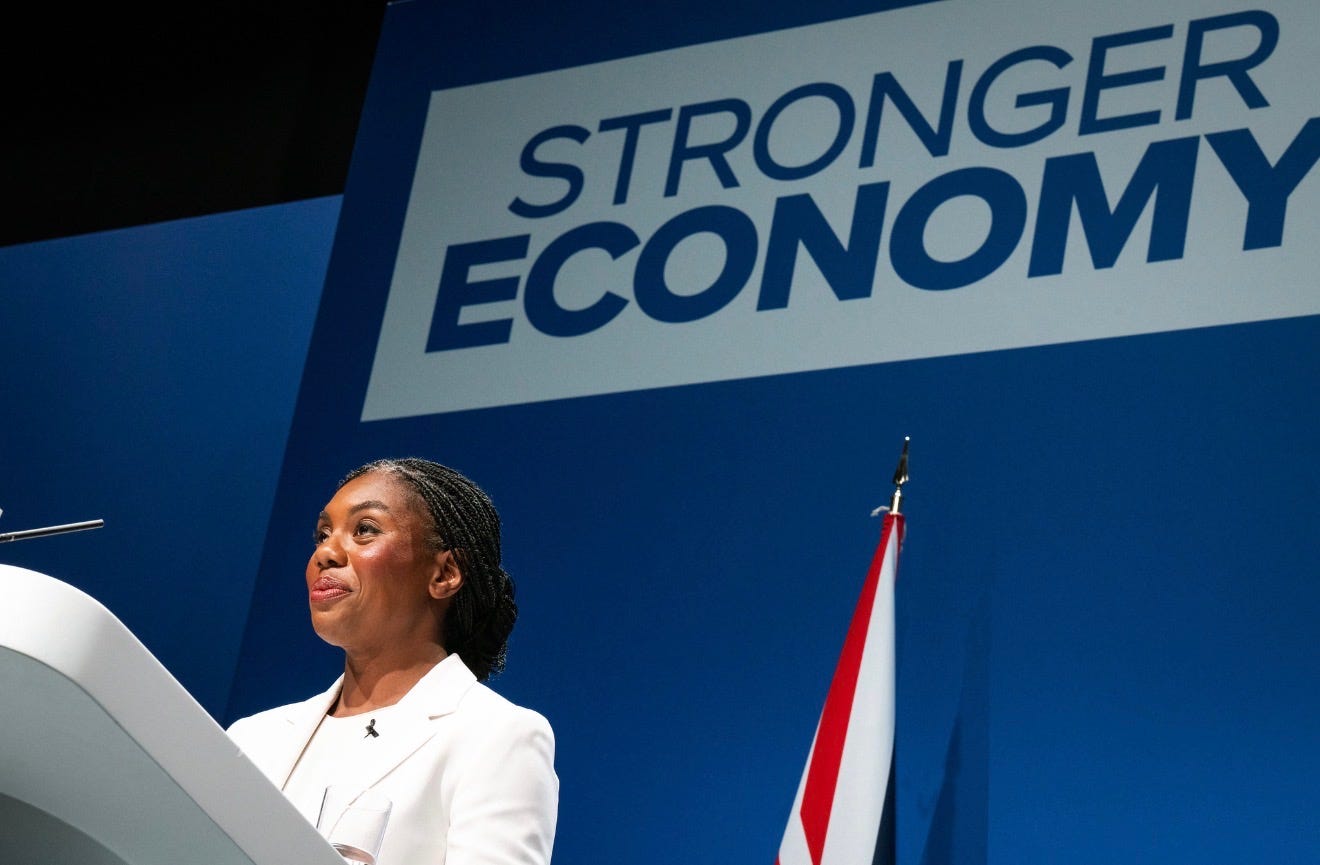After Left and Right
Progress vs Reaction is the new political divide

I have nothing to give Kemi Badenoch but faint praise. Her speech to Tory MPs and activists in Manchester was better than I expected it to be. Her headline grabbing policy announcement of abolishing stamp duty – a terrible tax that clogs up the labour market and discourages downsizing – was a positive one. But like the afternoon I set aside to write about this conference, time for the Tories has slipped away.
I could try and conjure 1000 words on whether the policy agenda unveiled in Manchester is deliverable or desirable but it would be a waste of my time and yours. Because none of it matters, the Conservatives are lost to an era of politics that no longer exists.
It’s become something of a truism that the political battle is now fought on the cultural axis where once it was fought on the left-right one. But I don’t think this is quite right. I believe the contest is now primarily between progressives and reactionaries, a battle the modern Tory party seems uninterested in.
When I talk of progressives I don’t mean damp leftists, the group that brought us Keir Starmer; people repelled by the excesses of socialism but too self-conscious to call themselves social democrats. I mean the term more literally than that; people who believe in progress and human flourishing, who look to the future to shape the present, who reject a zero-sum approach to life.
You can see it in many of those who back the abundance movement, yimbyism, and techno-optimism; there is a coalition bringing together people from social democrats to pro-market types, individuals whose disagreement on some important issues is transcended by a shared terms of reference about the end-goals of this political moment.
The reactionaries then, take the opposing view. There’s an important distinction between looking to history for solutions and fetishising a false narrative of where our species has been.
A desire for the present to look much more like the past is bringing together groups who would previously have hated each other; socialists steeped in nostalgia for the West’s industrial heyday now sit in an electoral coalition with those obsessed by a fictional poisoning of the bloodstream, whether by modern medicine or mass migration. The reactionaries are a broad coalition too, but all believe there is only so much opportunity to go round, all crave what has already been, they don’t value modern democracy.
This undercurrent has and still is transforming our politics and our societies. Trump’s election in 2016 and return earlier this year were both indicative of it, as was Britain’s journey to exiting the EU. A cursory glance across Europe shows the traditional parties of left and right collapsing almost everywhere. This is happening because they are fighting the last war.
In the UK, both main parties have tried to ride this change. The Conservatives for a time managed to bring the reactionaries into their existing electoral coalition. The Tories could only combine free market ‘global britain’ types with those want to “hang the pedos and fund our NHS” as long as they had a central goal to rally around, once Brexit was done there was no longer such a goal.
The reactionaries are a broad coalition too, but all believe there is only so much opportunity to go round, all crave what has already been, they don’t value modern democracy.
For Labour, the coalition looks slightly different, graduates hampered by slow wage growth and high house prices, and the ‘traditional’ working class Labour voter of old. The result is no less incoherent, the promise of growth at all costs set against rising taxes and industrial strategy, complete indecision in the face of Britain’s changing demographics. Labour cannot decide whether it is a party of progress or reaction.
Poor leadership through an unlucky series of global crises hastened the decline of the Tory party, but it would have happened eventually regardless. The coalition was built on sand. Poor leadership in the aftermath may do for Labour, but it is more likely to be death by a thousand cuts.
Unlike the Tories – for whom Reform is the primary threat – Labour’s vote is splitting in multiple directions. As a side note, this is a concerning trend for those of a progress mindset, there is a catch-all party for reactionaries but not yet an alternative for us. In a first-past-the-post system this increases the likelihood of a reactionary government.
The shift we’ve been witnessing has, in Britain, been somewhat obscured by our tendency to let America set the temperature of our politics. Labour have looked to the Democrats for lessons whilst the Tories have looked to the Republicans. But the United States is a proper two-party system in which the barriers for new entrants as so high as to be almost insurmountable. This has forced the change in political battle lines to happen within the mainstream parties rather than without them.
Those hoping the Republican party will return to Romney-ite sanity once Trump leaves office are wishful thinkers. The electoral coalition doesn’t exist anymore. The Republicans have been successful of late precisely because they have adapted to the new battle lines more quickly than the Democrats have.
The result is no less incoherent, the promise of growth at all costs set against rising taxes and industrial strategy, complete indecision in the face of Britain’s changing demographics. Labour cannot decide whether it is a party of progress or reaction.
In Britain, with no such protection, it is entirely possible that in ten years time Labour and the Tories are both almost irrelevant. The problem is that both parties contain authentic progressives and reactionaries, they are both so steeped in their internal history that their turning circle is limited. Any attempt to change will be hampered by loud voices within each party.
And so we return to a Tory conference trapped in the old politics. Where the dwindling band of Conservative activists can snap a selfie with some of Margaret Thatcher’s old outfits. There’s an argument to be made that authentic conservatism – the politics of sound money and respect for institutions – could be the new centrism. A check on breakneck progress, a respect for history rooted in pragmatism about the present. But this was not on display in Manchester.
The ‘conservative’ party promises spending restraint on the one hand but comes forth with unfunded tax cuts and refuses to reckon with the triple lock on the other. It claims to be different, and better, than Reform but also bemoans the lack of white faces and attacks the independence of the judiciary. The Conservatives have stopped being their own thing, they are exclusively defined by other people and other parties, trapped in the past, hoping that the battle lines will return to those they are comfortable with. But they won’t. The world has moved on.
Many of us are worried about the rise of the reactionaries. And with good reason, they threaten to return the West to an intellectual and political dark age. But we should be even more worried about the lack of a coherent party political alternative. There are people to be persuaded, to be won back from the tide of reaction, but there is not yet a new vehicle to do so and the current ones look spent.
In the UK neither Labour nor the Tories seem up to the task. In France, President Macron’s coalition is falling apart, the neo-fascist Rassemblement National look set to take power whether this year or in 2027. In the US the Democrats are more divided and unpopular than they have been in decades as Trump threatens to imprison his political opponents. The enemies of the enlightenment are gathering, for the sake of democracy we badly need something better to confront them with.
Thank you for reading Build Vector, if you’ve enjoyed this piece then please consider subscribing, it’s free and you have nothing to lose except a tiny portion of your life. You can find me on X @Jack_Nostalgic



